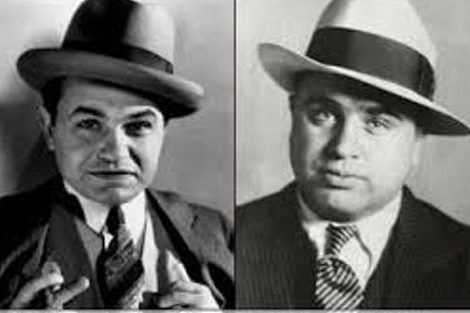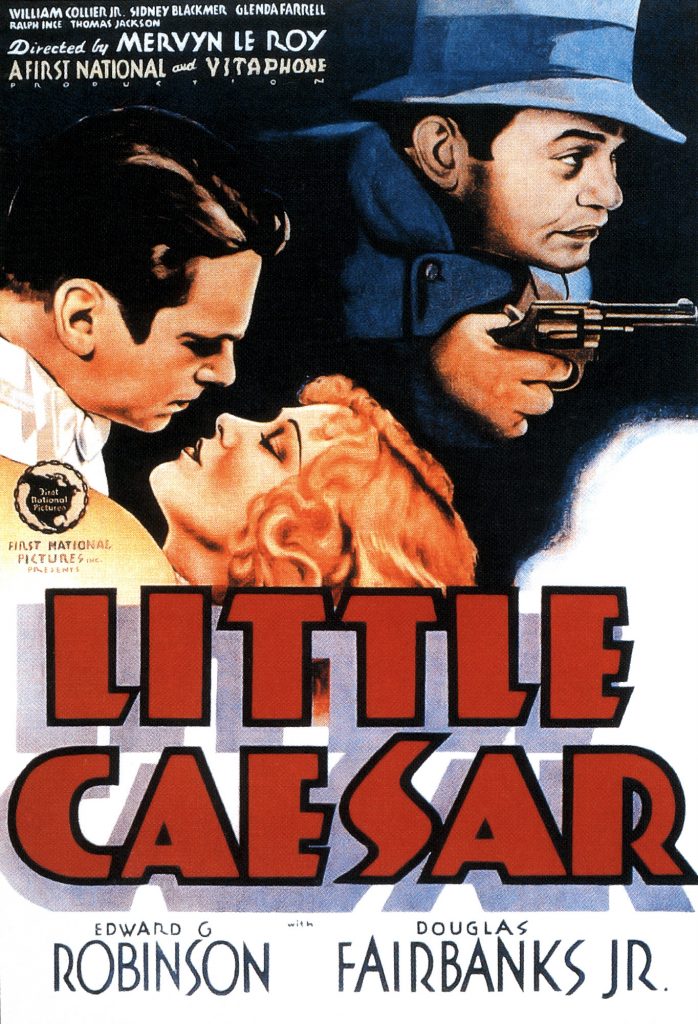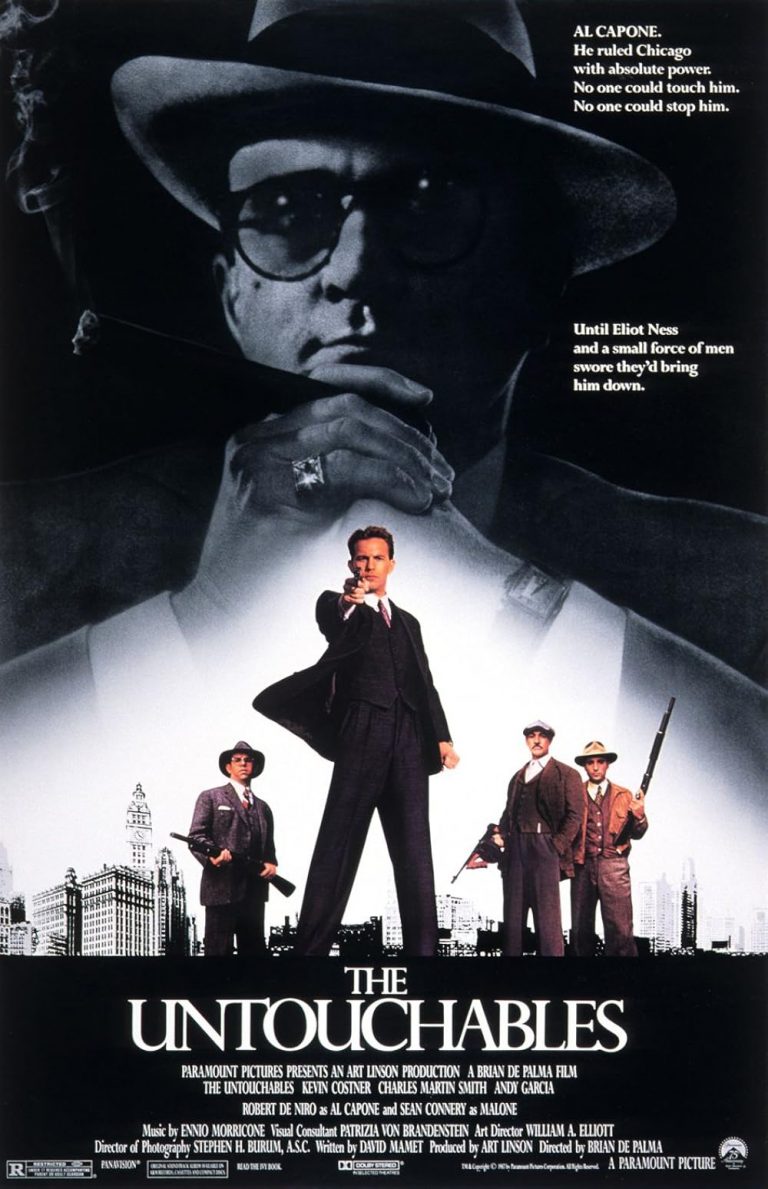Starring: Edward G. Robinson, Douglas Fairbanks Jr., and Glenda Farrell
Grade: B-
Ladies and gentlemen, the rise and fall of Rico Bandello. This is the story of Little Caesar.
The above line would’ve been great for the opening caption, am I right?
Summary
Opening with a bible verse from Matthew, we see the caption: “–for all they that take the sword shall perish with the sword”.
Once best friends Caesar Enrico “Rico” Bandello (Robinson) and best friend Joe Massara (Fairbanks Jr.) hold up a couple of gas stations, they go to a diner. After ordering spaghetti and coffee (which is wild to me), Rico notes how big-time gangster “Diamond” Pete Montana (Ralph Ince) is getting recognized in the newspaper. Rico is annoyed because he thinks they should be doing much bigger and better things like Montana. He points out he’s never been approached for an opportunity, but if he did, he would capitalize. Joe likes the idea of moving up in the world and making big money, but he has no problem in saying he would go back to dancing if he had the chance. This annoys Rico even more, who talks about his dreams of being somebody in the criminal underworld rather and how he can have all the power he desires in doing so. Joe gives him words of encouragement.
Later, they move to Chicago.
In terms of criminals and the gangster lifestyle, this is where the big boys play.
Rico goes to Club Palermo, the front for mob boss Sam Vettori (Stanley Fields). There, he asks to join his gang and though Vettori runs a tight ship, he welcomes in Rico. Immediately, he introduces Rico to the crew consisting of driver Tony Passa (William Collier Jr.), little Otero (George E. Stone), Bat Carilla, Killer Peppi, Kid Bean, and the very smart Scabby. After he introduces himself as Caesar Enrico Bandello, Vettori christens him “Little Caesar”, and he’s cool with it. Elsewhere at a club named the Bronze Peacock, Joe is making moves as a dancer. Fellow dancer Olga (Glenda Farrell) gets him a job there and the owners of the club seem to like him. After a performance, Olga hangs out with Joe, and they both admit they like each other. However, when they embrace, she feels Joe’s gun on him and gets a little freaked out. He downplays the whole thing, and she calms down, hoping to make this a relationship that will last. Joe has his doubts though. At Little Arnie Lorch’s gambling house, Little Arnie (Maurice Black) is called in for a meeting with Vettori who’s accompanied by Rico. Vettori was asked to come on behalf of “Diamond” Pete Montana, so the anxious Arnie accepts this because of the weight Montana’s name holds. Just then, Montana comes into the room. As Montana lays out some plan, Rico goes to the center of the room to listen, but Arnie starts yelling at him because he’s the least important person in the conversation. Vettori responds by having Rico wait outside.
Following this, Montana tells them about Alvin McClure (Landers Stevens), the head of the new crime commission who’s really laying down the law. He says, “The Big Boy” (Sidney Blackmer) has told him to have Vettori and Arnie keep a low profile for the next few months. Arnie says he’s never met anyone “The Big Boy” couldn’t get to, so he’s not worried. Montana assures him however that McClure is as straight as an arrow and can’t be influenced, so they have to be careful. He even points out that someone like Rico could get them in trouble. On the way out, he tells Rico to chill out with his trigger finger, and Rico agrees. Arnie tries to antagonize Rico before he leaves with Vettori, but he’s unphased by Arnie’s comments. Later at Club Palermo, Vettori notes Arnie’s interest in the place. The members of the gang start arguing over if they should be worried or not, and Rico gets a little aggressive with his words, prompting Vettori to point out Joe being late to their meeting. They discuss a potential job Rico and Scabby have been working on, but Vettori rips up Rico’s plans and tells him he himself will be the only one doing planning for the gang. Once Rico storms out, Vettori works on a specific plan with everyone else. As Rico waits outside, Joe shows up and blames being late on rehearsals. Rico tells Joe he’s the main part of their next job, and it will take place at the Bronze Peacock because Joe’s co-workers would never suspect him to be an accomplice. Joe flips out because he wants to be done with this whole mess of a life, but Rico forces him back into the meeting, telling him this is his job.
The robbery is planned for New Year’s Eve. At the event, Arnie is there and sees McClure has shown up. He sends DeVoss to invite McClure over for a talk, but after DeVoss says Arnie is his “financial backer”, McClure refuses. He knows Arnie is the infamous “Little Arnie” and seeing that he’s connected in a way to the Bronze Peacock, McClure takes his guests and leaves. In the meantime, Rico’s plan goes off without a hitch. However, on the way out, Rico runs into McClure, shoots, and kills him. Joe gets back to Olga and tells her what happened, and she immediately accuses him of doing it which he denies. She then begs for him to never cross paths with the gang again, but Joe knows that’ll be impossible. Rico escapes in a car with the nervous Tony as the driver, and Rico slaps him to get him to drive away. He goes back to tell Vettori the news about McClure, and he chastises Rico for it because McClure is the one man he needed to avoid. Rico responds by calling Vettori soft. Elsewhere, a panicked Tony is supposed to pitch the car, but he crashes it into a pole and leaves it on the street. At Club Palermo, Lt. Flaherty (Thomas E. Jackson) shows up, so Rico hides. Flaherty questions Vettori on things, but they don’t have anything concrete on him or anyone, so they leave. Even so, Flaherty is strangely confident when he leaves the room. Rico comes back into the room and says he’ll take care of Tony, but he wants to split the money from the job his way, not Vettori’s.
Vettori tries to argue, but Rico tells him he’s through with Vettori’s leadership. The rest of the guys don’t back up Vettori, so he accepts his loss of position. Rico has officially taken over as the leader of this gang, and he will continue to fast track is way to the top of the criminal underworld. Problems will inevitably creep to the surface however because Joe’s presence will forever hang over Rico’s head no matter how well he’s doing.
My Thoughts:
Sometimes, I have trouble grading films from the Golden Age of Hollywood accurately. Little Caesar is one of them. As a movie fan, I understand the film’s importance. Along with The Public Enemy that came out months after this one, these two films set the bar for the gangster film. It was a game-changer that redefined what you can do with a protagonist and ignited one of Hollywood’s most popular genres of film. Along with this, it’s easily one of the best movies of 1931. What makes things difficult is that this is a genre that has gotten better and better with age. Though there are so many good-to-great gangster films during this timeframe, I’d argue almost all of them took note of what Little Caesar did and did it better.
Did Little Caesar define a genre? Yes.
Was it a revolutionary film? Yes.
Are there (at least) twenty gangster films from the 1930s and 40s alone that are better than it? Yes.
Now, there are a lot of positives coming from this influential film, and it starts with the star-making performance of Edward G. Robinson. Though he wasn’t the prettiest of Hollywood leading men, especially when it seemed to be a requirement back then, he is what the part was calling for. There needed to be a different type of actor with a specifically different look to play someone like Rico Bandello. You needed someone who’s meaner, nastier, and built like a real gangster. Let’s be honest, Robinson fits the bill of a killer. I’d even argue Robinson resembles Al Capone himself. Rico runs the outfit in Chicago after all.

Edward G. Robinson’s Rico feels like a real gangster from this time period, a man willing to do anything for power and doesn’t mind having his name in the papers because he likes being recognized as “The Man”. He doesn’t care to be the man with all the power that waits in the shadows like some of his counterparts are. He wants to be known. The idea of being somebody consumes Rico. It separates him from his best friend Joe right in the opening, foreshadowing the rest of the story. With enough money, Joe would just go back to dancing because he really wants to be a performer, but Rico wants to be a lifetime criminal. He wants to be the gangster everyone knows and fears. With enough money, his aspirations will only get bigger. He’s a guy who always wants more because he wants to be at the top and will push to see how much further he can go. If he knows he’s capable of doing so, why not strive for it?
The unbridled confidence he walks in with sets the tone. As they get to Chicago, Rico tells Vettori he wants to work for him and will do anything to prove himself. We believe him because we know his mindset before he walks into that meeting. What’s important about this scene is that Rico doesn’t ask to be a part of Vettori’s gang out of desperation, or because he’s a lost puppy trying to find his way in the world. Rico is just about wanting more and is tired of doing small time jobs. This is the natural step up as a criminal. Joining one of the most powerful gangs in the city is the first step he needs to take to reach his ever-changing goals. He walks into that meeting with Vettori with this confident attitude of “You need me, and I’ll show you why”. If Vettori sent Rico packing, he’d probably just move to the next crime boss and still go through the same steps. However, Rico’s fearlessness and belief in himself is noticed by Vettori, and this is why he’s added to the team so quickly and given such leeway, despite him being prone to violence and unpredictable behavior.
His rigidness, unshakeable ideals, and pure ferocity shows you how good Edward G. Robinson was in the role. He’s ready to pounce on anyone and anything. He’s ruthless and is against anything that is a distraction whether it be alcohol or women. This was very interesting to me. It may be the one thing that makes this film different from all the others, but it’s a great storytelling device to explain how quickly Rico is able to rise up in the ranks. He’s focused. His only issue is that he loves the praise and the accolades. As we know in gangster movies, when your name becomes more and more associated with big time criminal behavior, someone will inevitably want to take you down, whether it be from determined law enforcement, or jealous peers tired of hearing the attention you’re getting. In these movies, they are common themes, and Rico pisses off both sides of this coin in hopes of getting to the top. If you’re weak, he’ll leave you behind. To show you how consumed he is with being “The Man”, he becomes so successful, he’s one of the lucky criminals who’s allowed to visit “The Big Boy”, the lead gangster who oversees everything in the area. The Big Boy gives Rico the area owned to “Diamond” Pete Montana, along with existing territory he already has, but the first thing he says when he gets back to Otero is how he can eventually unseat Big Boy and control even more. A man this obsessed will have an inevitable downfall. It’s how life goes, and we know the same will happen with Rico. However, his undoing, regarding his inability to kill Joe is a welcomed shock, leading us to one of the better movie endings of the entire decade.
Little Caesar is riddled with problems though. As great as Rico is as the villain, I still don’t feel like we really know him. The only time we get a little insight of how he thinks is when he offers Joe a shot of brandy or a cocktail in the vein that Big Boy offered to him because he sees it as how the most powerful of people act. Additionally, we see this when his eyes light up when Big Boy tells him how the painting on his wall costs $15,000. He doesn’t admire the picture for what it is, you can tell he just likes the idea of being as wealthy and powerful as Big Boy is.
Besides this, there’s the last part of the film when he’s in the gutter and gets pissed off with how he’s portrayed in the papers, showing how fragile his ego is, but it was too little too late. We needed to get to know him much earlier. Most of the character is surface level stuff (aggression, ruthlessness, etc.) that works for the story. Though Robinson plays this part of the character well, we don’t learn enough about him to truly understand where he’s coming from. We are given nothing regarding his backstory nor why he started on this path to becoming a gangster to begin with. Why does he have this kill-or-be-killed attitude? Plus, we never are given a good enough reason as to why he’s such good friends with Joe and why he sticks up for him so much. Why is he so devoted to him to the point of jeopardizing his own career? Did he save his life in the past or something? Why does he feel the need to keep Joe on these jobs when he consistently makes his intentions known? I understand from a villainous standpoint as to why he needed him for the Bronze Peacock job, but it makes no sense why he’s so adamant Joe should work with him once he takes over Montana’s territory. They have him say he’s worried Joe will snitch, but I feel like Joe is so far removed from gang banging at this point that Rico shouldn’t even consider this a possibility. You could say he’s paranoid, but Robinson didn’t play it like that.
What would’ve been intriguing would be Rico, proud of his position, trying to convince Joe to join him, talking about how it would be like the “good old days” and how since they’re both wealthy and successful, they couldn’t be stopped together. Then, mirroring the conversation from the opening, we can see them argue as they are still both firm in their goals of what they want to do with their money, with both still being on opposite ends of the spectrum. As a result, Rico would be enraged to force the issue like he did. I think this would’ve been a better way to take things because it would show more how Rico cherished their time together despite how he acts. It would make him a lot more well-rounded in the grand scheme of things and would make a lot more sense in the pivotal moment where he can’t bring himself to kill Joe.
I fucking loved the assassination attempt from Little Arnie’s boys on Rico. The bullets only graze him and as he lays on the ground when they drive away, he immediately yells at them, “Fine shots you are!”. It was unintentionally hilarious, as was Flaherty coming over right after to talk shit to him instead of calling for an ambulance.
The final line of the movie was selected as one of the greatest lines in cinema history by the American Film Institute. As you may know, it’s after Rico lays on the ground on his deathbed and asks the rhetorical question, “Mother of mercy, is this the end of Rico?”. Honestly, it doesn’t hold up at all. It made the whole thing sound like a TV serial. I thought a narrator was going to come on and say, “Tune in next week to find out!”. Eventually, I’ll do a revised list of the greatest movie quotes ever and that line sure as hell won’t be on it.
Little Caesar set the standard for every gangster movie that came after it. It’s hard not to give it a perfect score because at the time, there wasn’t anything like it. However, I can’t give it a full pass because of this alone. It’s good enough to watch if you’re binge-watching classic gangster movies, but as I mentioned before, it’s obvious to me that a lot of movies have learned from Little Caesar and have done it better. I’ll give credit where it’s due because this film is the “OG”, but it needs a little more detail to its story and characters to truly call it great. On top of that, Olga is fucking annoying, Flaherty is creepy, and Joe is a pussy. All things considered, I can’t go any higher than a “B-“.





+ There are no comments
Add yours